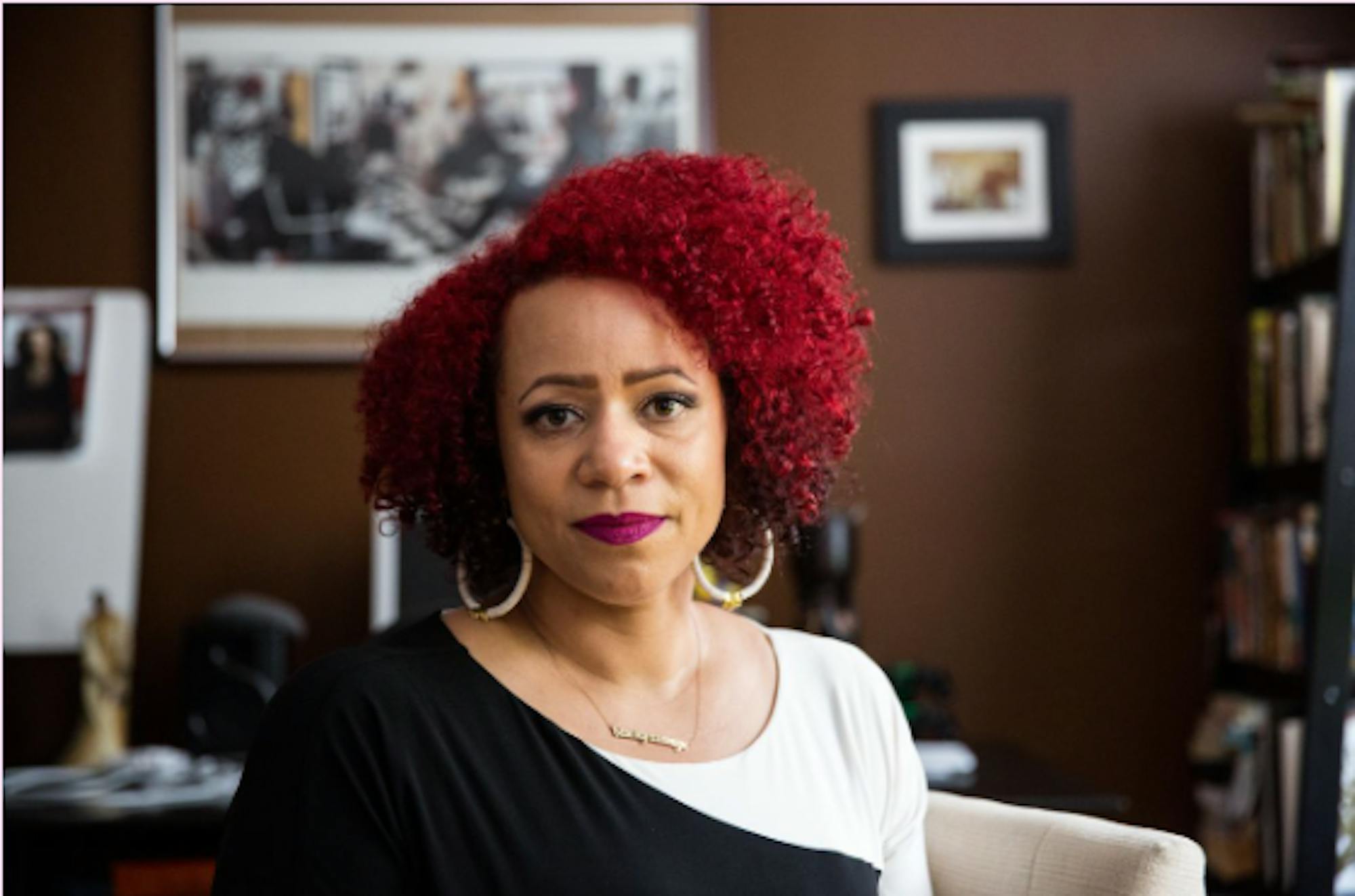Updated 11:34 a.m., April 19, 2022.
Renowned journalist and author Nikole Hannah-Jones delivered a sold-out talk at the Hopkins Center for the Arts on Friday, April 15. Joined by Dartmouth students and faculty, Hannah-Jones discussed the development of “The 1619 Project,” America’s history of slavery and how all of these tie to modern racial tensions. According to College president Phil Hanlon’s opening remarks, the talk was two years in the making, having been delayed by the pandemic.
Hannah-Jones is the inaugural Knight Chair in Race and Journalism at Howard University, where she also founded the Center for Journalism and Democracy. Additionally, Hannah-Jones is a staff writer at The New York Times Magazine. For her work investigating racial injustice and civil rights in the United States, she has won a MacArthur Foundation Fellowship, a Peabody award and two George Polk awards, among others.
Though this event focused on discussing her Pulitzer Prize-winning project, “The 1619 Project,” it was more so a grave warning to the audience about the precariousness of the state of America’s democracy. It was, as Hannah-Jones described in her talk, a “punch in the gut,” which many members of the audience said they felt.
The event featured speeches from Hanlon, English professor Vievee Francis and Tuck professor Ella L.J. Bell Smith. Anthony Fosu ’24 emceed the event.
Hannah-Jones started her talk by covering “The 1619 Project” and later went on to tie this project to current events, from Black Lives Matter protests and the Jan. 6 insurrection to debates about voting rights laws and current controversies surrounding critical race theory. Although the topics she covered could be considered frustrating and even demoralizing, she ended her talk on a high note with a call to action.
“We don’t have to accept the erosion of our democracy, we don’t have to accept the erosion of our rights,” Hannah-Jones said. “Hope is useless without action… If you want a better tomorrow, refuse to accept what we have and get out there and build it.”
Prescott Herzog ’25 became interested in the event after hearing about “The 1619 Project” in the news over the years as a source of right-wing controversy.
“It’s very important to know… where other groups are coming from, as a cis, white man,” Herzog said. “It helped me learn more about a different perspective… that I wouldn’t understand just coming from my identity... no matter how I get involved in politics, my goal is to help people”
Beyond just widening his perspectives, Herzog believes that Hannah-Jones’ warning to the audience did not go unheard.
“She said in the beginning that she wanted [it] to be a ‘gut punch’ about the state of our democracy, and I think I got that out of it,” Herzog said.
The event closed with a question and answer discussion with theater professor Monica Ndounou. During this portion, Ndounou and Hannah-Jones addressed the current state of racial reckoning in this country, the potential for reparations and the role of self-care in the work of an activist.
Some courses required students to attend the event, including LALACS 1, “Introduction to Latin America and the Caribbean” taught by professor Pamela Voekel and ENGL 6, “Narrative Journalism” taught by professor Alexis Jetter.
Jetter said she has followed Hannah-Jones’ career since she first came across an article Hannah-Jones wrote for the New York Times Magazine in 2016. She brought her students to this event so that they could hear from a journalist connecting American history with modern culture war issues.
“When asked ‘Why Nikole Hannah-Jones?’ it’s because of who she is now, what she’s done journalistically, and what she’s done to really light the fire on this totally new rethinking of American history,” Jetter said in an interview after the event. “Since [our class] studies Ida B. Wells, I thought, ‘here’s her modern counterpart’… Something [they both do is] skewer hypocrisy.”
The event also featured a performance from Dartmouth’s social justice acapella group, the Rockapellas. Lexy Piton ’24, a member of the Rockapellas, said that being able to sing at this event was especially important to her.
“The Rockapellas being asked to open for ‘The 1619 Project’ event was an honor and getting to open the show with a song centered around women of color was especially powerful,” Piton said. “Centering Black women at the beginning of the program meant a lot to me as a Black woman.”
Piton said she feels hopeful that Dartmouth hosting this talk may indicate that the College will finally address its own history of institutional racism.
“Our own institution reaped incredible financial gain from the very same practices Hannah-Jones compiled in her work,” Piton also said. “It does [excite] me that so many people from the Dartmouth community were so vocal about their support for Nikole Hannah-Jones’ work at the event, and gives me hope that sometime in the future Dartmouth can grapple with its racist past as Hannah-Jones encourages all Americans to do.”
Jessica Sun Li '24 is a sociology major and English minor from the suburbs of Chicago. She was the 180th Directorate's arts editor, and her passion project is the "Dear Mirror" column. Outside of The Dartmouth, she is involved in the figure skating team and sociology research. She really wants to adopt a cat.




